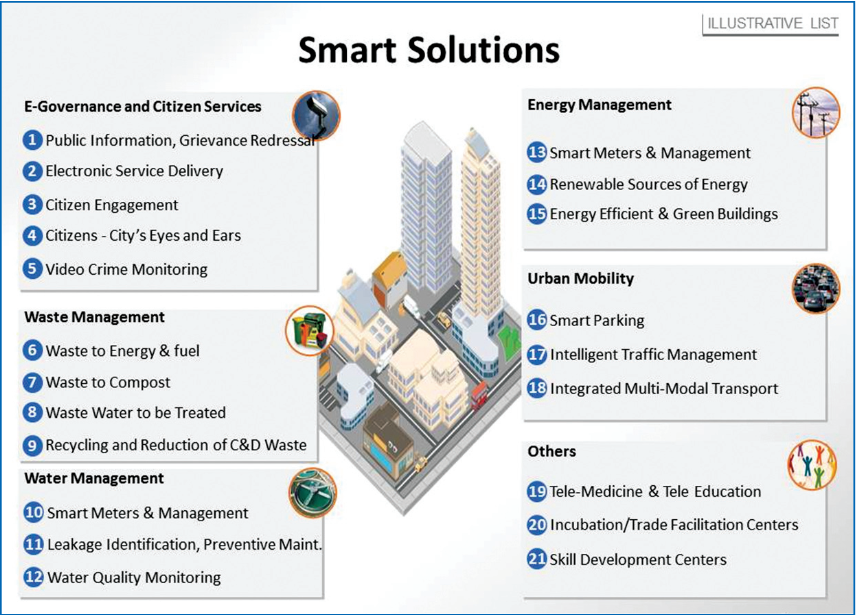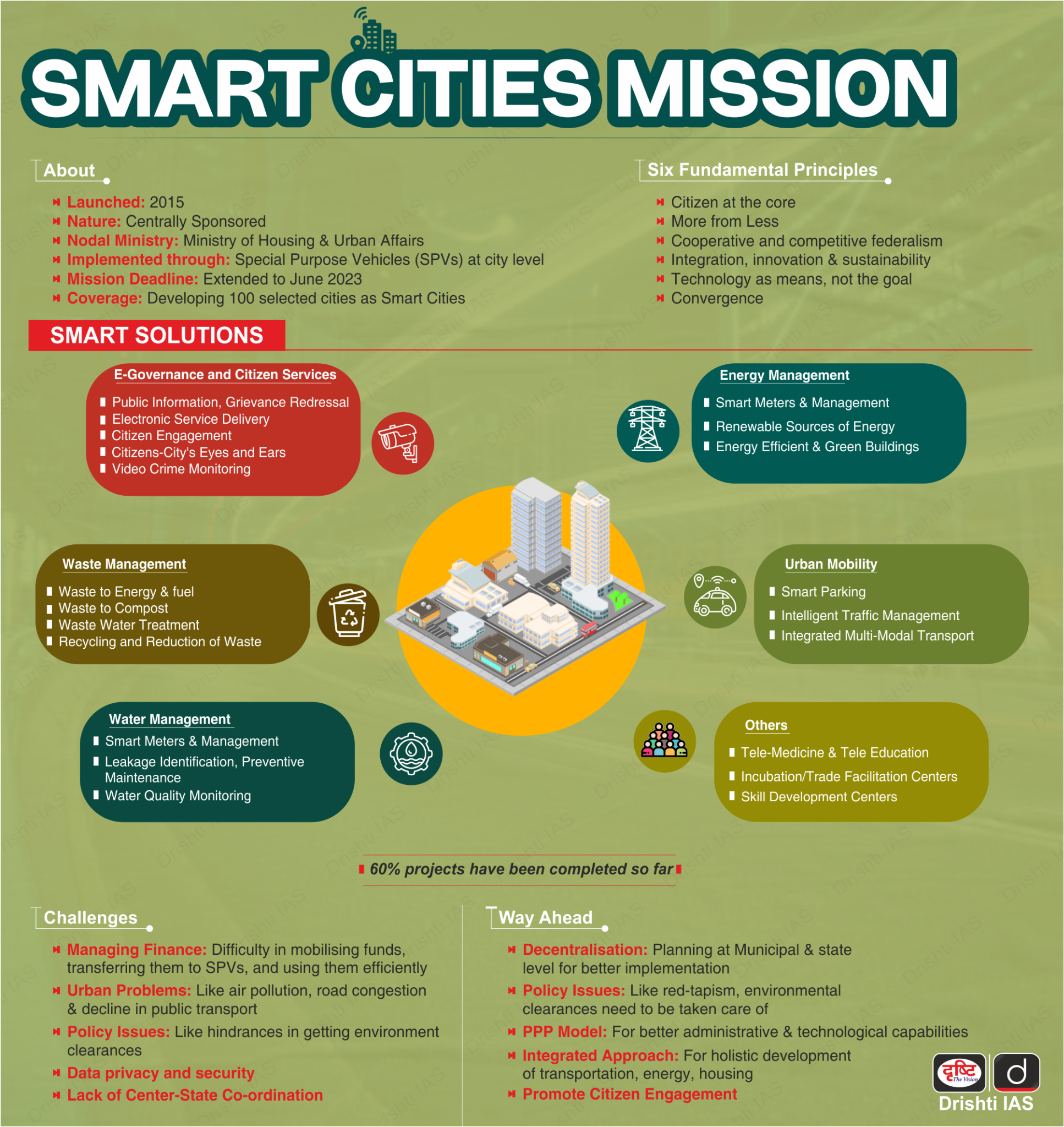Governance
Extension of Smart Cities Mission
- 06 Jul 2024
- 10 min read
For Prelims: Smart Cities Mission, Centrally Sponsored Scheme, Sustainable development, Special Purpose Vehicle (SPV), Public-Private Partnership (PPP), Atal Mission for Urban, Rejuvenation and Urban Transformation (AMRUT), Pradhan Mantri Awas Yojana-Urban (PMAY-U), Climate Smart Cities Assessment Framework 2.0, TULIP-The Urban Learning Internship Program
For Mains: Smart Cities Mission: Significance & Challenges
Why in News?
Recently, the Central Government has decided to extend the deadline for Smart Cities Mission till 31st March 2025.
- Initially planned for completion by 2020, the mission had already been extended twice.
What is the Smart Cities Mission (SCM)?
- About:
- It is a Centrally Sponsored Scheme, launched in June 2015 to transform 100 cities to provide the necessary core infrastructure and clean and sustainable environment to enable a decent quality of life to their citizens through the application of "Smart Solutions".
- It aimed to improve the quality of life for citizens through sustainable and inclusive development.
- Components of the SCM:
-
Area-based Development:
- Redevelopment (City Renewal): Renewal of existing urban areas to improve infrastructure and amenities. E.g. Bhendi Bazar, Mumbai.
- Retrofitting (City Improvement): Upgrading infrastructure in existing areas to make them more efficient and sustainable. E.g. Local Area Development (Ahmedabad).
- Greenfield Projects (City Extension): Development of new urban areas with a focus on sustainability and smart technologies. E.g. New Town, Kolkata, Naya Raipur, GIFT City (Gujarat International Finance Tec-City).
- Pan-City Solutions:
- Implementation of Information and Communication Technology (ICT) solutions across various sectors such as e-governance, waste management, water management, energy management, urban mobility, and skill development.
-
- Governance Structure:
- To enhance effectiveness, a new governance model was adopted.
- A Special Purpose Vehicle (SPV) was created under the Companies Act, 2013 led by a bureaucrat or a representative of a Multinational Corporations (MNC).
- To enhance effectiveness, a new governance model was adopted.
- Financing of Smart Cities:
- The SCM receives Rs. 48,000 crores over 5 years from the Central Government, averaging Rs. 100 crore per city per year.
- States and Urban Local Bodies (ULB) are required to contribute an equal amount, resulting in a total of nearly Rs. 1 lakh crore for Smart Cities development.
- Convergence with Other Government Schemes:
- The SCM can be strategically converged with other Central and State Government programs to utilise its full potential.
- Benefits of Convergence:
- Combining resources and objectives of SCM with schemes like AMRUT (urban transformation), Swachh Bharat Mission (cleanliness), HRIDAY (heritage city development), Digital India, Skill Development, and Housing for All leads to a more comprehensive approach.
- Existing funds and infrastructure from various schemes can be leveraged to achieve common goals within the SCM framework.
- Convergence ensures social infrastructure (health, education, culture) is addressed alongside physical infrastructure development in smart cities.
What is a Smart City?
- A Smart City is a concept that refers to the use of technology, data, and innovative solutions to improve the efficiency, sustainability, and quality of life in urban areas.
- Core Infrastructure Elements of a Smart City include:
- Adequate water supply,
- Assured electricity supply,
- Sanitation, including solid waste management,
- Efficient urban mobility and public transport,
- Affordable housing, especially for the poor,
- Robust IT connectivity and digitalisation,
- Good governance, especially e-Governance and citizen participation,
- Sustainable environment,
- Safety and security of citizens, particularly women, children and the elderly, and
- Health and education.
Note:
Cities accommodate nearly 31% of India's current population and contribute 63% of Gross Domestic Product (GDP) as per Census 2011. Urban areas are expected to house 40% of India's population and contribute 75% of India's GDP by 2030.
What are the Challenges Faced by the Smart Cities Mission?
- Lack of Clarity in Definition: The SCM has acknowledged the lack of a universal definition for the term "smart city." This recognition reflects the understanding that each city's vision for a smart city is shaped by its unique local contexts and aspirations. However, this ambiguity in the conceptualisation of a smart city poses a challenge in effectively allocating resources and prioritizing projects.
- The conceptualisation of a Smart City varies significantly from one city to another, and even from country to country. These differences are influenced by factors such as the level of development, the willingness to embrace change and reform, the availability of resources, and the aspirations of the city's residents.
- Delay in Project Completion: Despite the extension of the deadline, a significant number of projects (around 10%) are still incomplete, indicating delays in execution. This can be attributed to factors such as inadequate planning, lack of technical expertise, and issues in land acquisition and clearances.
- Inadequate Funding and Its Utilisation: While 74 cities have received 100% of their central share, 26 cities are yet to get the full funding due to the slow progress of projects.
- The SPV model adopted for smart city projects has faced objections due to its misalignment with the 74th Constitutional Amendment. This has resulted in criticism of the top-down governance structure of the smart city initiatives.
- Lack of Coordination: Effective coordination between the central, state, and local governments has been a challenge due to differences in priorities, bureaucratic hurdles, and lack of clarity in roles and responsibilities that have hindered the seamless implementation of the mission.
- Sustainability Concerns: There are doubts about the long-term sustainability of the smart city projects, as many of them focus on technology-driven solutions rather than addressing the fundamental issues of urban planning and governance.
- Displacement and Social Impact: According to the World Bank, in urban areas of India more than 49% of the population live in slums.
- The execution of smart city projects has led to the displacement of residents in poorer areas, such as street vendors, disrupting the fabric of urban communities. Infrastructure development in certain towns has contributed to increased urban flooding due to disruptions in water channels and contours.
What Should be the Steps Taken to Strengthen Smart Cities Mission?
- Effective Governance and Implementation: Appointing CEOs with fixed tenures ensures continuity and attracts qualified professionals. Stakeholder representation, including experts and Member of Parliaments (MPs), fosters inclusive decision-making.
- Strategic Project Focus: The SCM digital infrastructure is expected to generate and utilise vast amounts of data from diverse sources. Therefore, it is necessary that a robust system should be implemented to protect these platforms from cyberattacks and guarantee adequate protection for sensitive public and private data.
- Data Security and Upgradation: Establish robust digital infrastructure protection to counter cyber threats and safeguard data privacy.
- Develop comprehensive Operation and Maintenance (O&M) strategies to maximise infrastructure lifespan and ensure timely upgrades.
- Building Capacity and Funding: Strengthen Urban Local Bodies (ULBs) in smaller cities through capacity building programs. Central government assistance can be crucial for organisational restructuring and skill development.
- Ensuring Project Completion: The Ministry's role should extend beyond fund allocation. Active monitoring and providing expertise for timely project execution are essential.
- Global Knowledge Sharing: India's focus on sustainable urban development positions it to guide similar projects in developing nations (Example: Gelephu Smart City Project in Bhutan).
- The Gelephu Smart City Project aims to create an economic corridor connecting South Asia with Southeast Asia through India's northeastern States. It will prioritise environmental standards and sustainability, seeking quality investment from specially screened international companies.
|
Drishti Mains Question: Q. What is the Smart Cities Mission? What are the challenges faced by this and suggest the measures to address these challenges. |
UPSC Civil Services Examination, Previous Year Question (PYQ)
Mains:
Q. With a brief background of quality of urban life in India, introduce the objectives and strategy of the ‘Smart City Programme.’ (2016)






